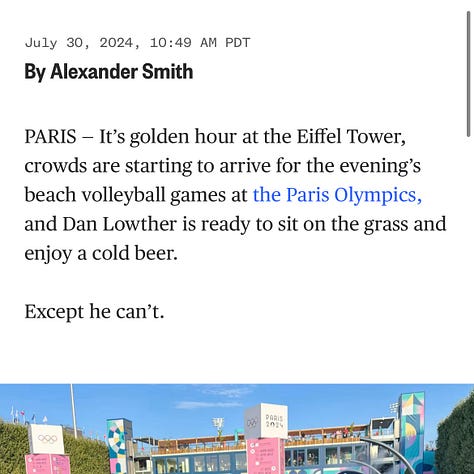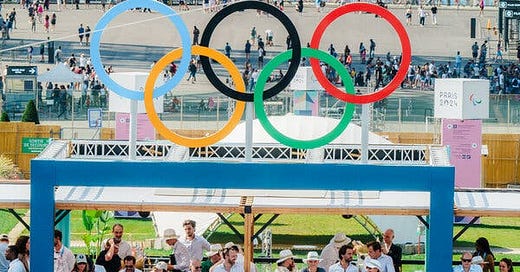TGIF :: France Hosts Dry Olympics
#65 || And the Gold Medal for effective Alcohol Policy Goes to.... France! 🥂 🌟 ✨
A dear Parisian friend sent me this earlier this week with the note: “Did you see?”



I did a little digging around and she’s right—the Paris Olympics are dry (other than in designated VIP areas, more on that below).
Upon reading this, my first assumption was that this was a decision made by the organizers to keep the Olympics a relatively “sober” affair. My second assumption was that the event organizers and alcohol brands opposed this choice.
A bit of research indicated I was wrong about both.
It’s French Law, Not the Hosts, Making the Rules
La Loi Évin or Évin’s Law was enacted in 1991 and since integrated into the National Health Code. The law limits the marketing and advertising of alcohol and tobacco products in media and at sports events to 1) reduce deaths (49,000 per year in France attributed to alcohol and many more linked to tobacco) and 2) limit youth exposure to alcohol and tobacco advertising.1
It further prohibits the sale of alcoholic beverages inside stadiums during sporting events and the use of alcohol brand names in their titles and marketing. You may have noticed modifications to comply with legal guidance such as The Heineken Cup being known as The H Cup in France, while The Guinness Six Nations is just called The Six Nations.
This means that France, the country perhaps most renowned worldwide for its high end alcoholic exports, has some of the most stringent rules on advertising alcoholic beverages. (A bit reminiscent of China as home base for the global sensation TikTok not allowing their own teens to access it… another post for another day).

The Details of Évin’s Law
Ironically, while a first law was passed in 1985, the government did not produce an acceptable text till 1991. Big alcohol heavily exploited this six year delay with an avalanche of advertising which led the government to implement the clear and highly effective Évin Law.2 Here are the basics (a good model for other nations, I might add):
A clear definition of alcoholic beverages: All alcoholic drinks over 1.2% alcohol by volume are considered alcoholic beverages.
Places and media where advertising is authorised are clearly defined.
Alcohol advertising cannot target young people.
Alcohol advertising is prohibited on television and in cinemas.
Alcohol sponsorship of cultural or sport events is prohibited.
Alcohol advertising is permitted only in the press for adults, on billboards, on radio channels (under precise conditions), at special events or places such as wine fairs or wine museums. When advertising is permitted, its content is regulated:
Messages and images can refer only to the qualities of the products such as degree, origin, composition, means of production, patterns of consumption (eg: no images of sexy women, people having a great time drinking, or other common marketing tactics we are familiar with in the U.S.).
A health message must be included on each advertisement, such as “l’abus d’alcool est dangereux pour la santé” (the abuse of alcohol is dangerous for health).
Wait, Couldn’t They Get An Exemption for the Olympics?!
Apparently not. The law allows for an exemption for 10 events per organiser per year per municipality, but given the scale of the Olympics, the effort was deemed pointless, as reported by Reuters:
“Paris 2024 will be organizing more than 700 competition sessions over 15 days of competition . . . It is not for Paris 2024 to comment on this application of different laws, but for the legislator to define the relevant framework for event organizers.”3
This is not the case for this year’s more manageable Rugby World Cup, however, as organizers negotiated an exemption for the tournament taking place in September and October.
What About Other Olympic Games?
2012: Rio de Janeiro—beer and wine available for sale
2016: London—beer and wine available for sale
2020: Tokyo—the sale of alcohol was banned, yet thanks to the pandemic, we watched the Games from our sofas with our own beverage of choice in hand.
2024: Paris—alcohol and alcohol marketing banned, except for VIP areas governed by different “hospitality” regulations. The New York Times just covered this phenomenon for us here.
2028: Los Angeles—expect a lot of alcohol and alcohol marketing. Beer sponsorships have already been sold.

Understanding Évin’s Law Outside of the Olympics
Advertisers have had to do some of their own gymnastics to understand what is allowed and what isn’t allowed under Évin’s Law.
In a nutshell, the cannot associate drinking “with a positive image” or “incite people to consume,” (how all of our alcohol advertising in the U.S. works, by the way, even targeting youth with these messages).
In France, a poster showing a glass of wine in order to promote a wine fair is allowed, but having a hand holding a glass is considered to be incitement to drink and is therefore not accepted. This is what the Club des Vignerons Lauréats found with their posters created to promote their wine show:
Further, in January 2023, the Judicial Court of Paris ordered Instagram and the META group to remove 37 publications that promote alcohol. The Association Addiction France explains in a press release that “influencers push alcohol consumption by associating the product(s) presented with their positive image” which is a big no-no.
Isn’t This a Bit Extreme?
Maybe, but it appears to be working. As reported by the NIH which studied the efficacy of these measures:
Conclusions: Regulating alcohol advertising content via strongly prohibitive measures, as per France's Évin law in 1991 or similar measures in other countries, is an effective policy direction for protecting vulnerable young people. This approach should be considered by countries that currently have only partial bans on alcohol advertising placement.
You can read the full report here.
Are Other Countries Following Suit?
I didn’t research the entire world for today’s TGIF, but I can report that in 2021 Ireland passed a new ban on alcohol advertising during sporting events, which some have compared to France’s law.
And in 2014, a group of leading healthcare professionals in the UK wrote an open letter to government ministers urging them to prevent alcohol producers from sponsoring sports teams, evidencing the difference between the UK and France.
The letter says:
“Shouldn’t our national sports be inspiring our children to lead healthy and positive lifestyles? It would be considered outrageous if high-profile teams like Everton or Celtic were to become brand ambassadors for tobacco, and so why is it acceptable for alcohol?”
And: “Self-regulation of alcohol advertising isn’t working when it allows drink brands to dominate sporting events that attract children and adults, creating automatic associations between alcohol brands and sport that are cumulative, unconscious and built up over years.”
And: In a final plea to ministers: “Importantly, evidence shows that exposure to alcohol advertising leads young people to drink more and to drink at an earlier age.”
These efforts weren’t successful, yet, but they are ongoing and I appreciate the progress, even if it’s gradual. All too often big corporate interests override broader wellbeing interests. It’s time to swing the pendulum back a bit.
What Did I Miss?
Many of you readers are tracking global alcohol policy far more carefully than I. What did I miss? What are you seeing? Are lobbying efforts eroding these laws or are other countries gradually catching on? I’ve been fascinated to follow NIH studies on the efficacy of these policies, but what else are you seeing? Please add a comment or send me a note.
And, be well.
Love. ❤️
Miscellaneous…
Big Alcohol Sales Are Slipping…. Diageo, the company with one of the largest portfolios of liquor brands in the world with brands including Johnnie Walker, Smirnoff, Crown Royal, and Captain Morgan had a rough week. Shares tumbled more than 10% at one point on Tuesday as it posted its first sales decline since the start of the pandemic. CNBC coverage here.
The USAPA is hiring… The U.S. Alcohol Policy Alliance (USAPA), a nonprofit, nonpartisan organization translating alcohol policy research into public health practice, is seeking a seasoned, entrepreneurial Executive Director. You can learn more and apply here.
Sangha Saturdays… The next Sangha Saturday will be on August 10th at 9am PT. Please indicate your interest via the form link here and you’ll be added to the invitation(s).
https://www.researchgate.net/publication/283322071_The_French_Evin_law_content_effectiveness_and_limitations
https://movendi.ngo/news/2020/06/19/france-alcohol-advertising-ban-wins-case-in-high-court/
https://www.foodandwine.com/paris-olympics-2024-alcohol-ban-7554922 also reviewed for this piece.







So cool! Thank you for sharing this, Cecily!
I do find it a bit odd that with that much focus on keeping alcohol out of events that they allow a VIP 'loophole' of some sort. Reminds me of back in the early 00's when most college events were dry, except if you had premium seats in certain stadiums/arenas, you could have alcohol. A bit sad that the NCAA has further loosened its alcohol restrictions.